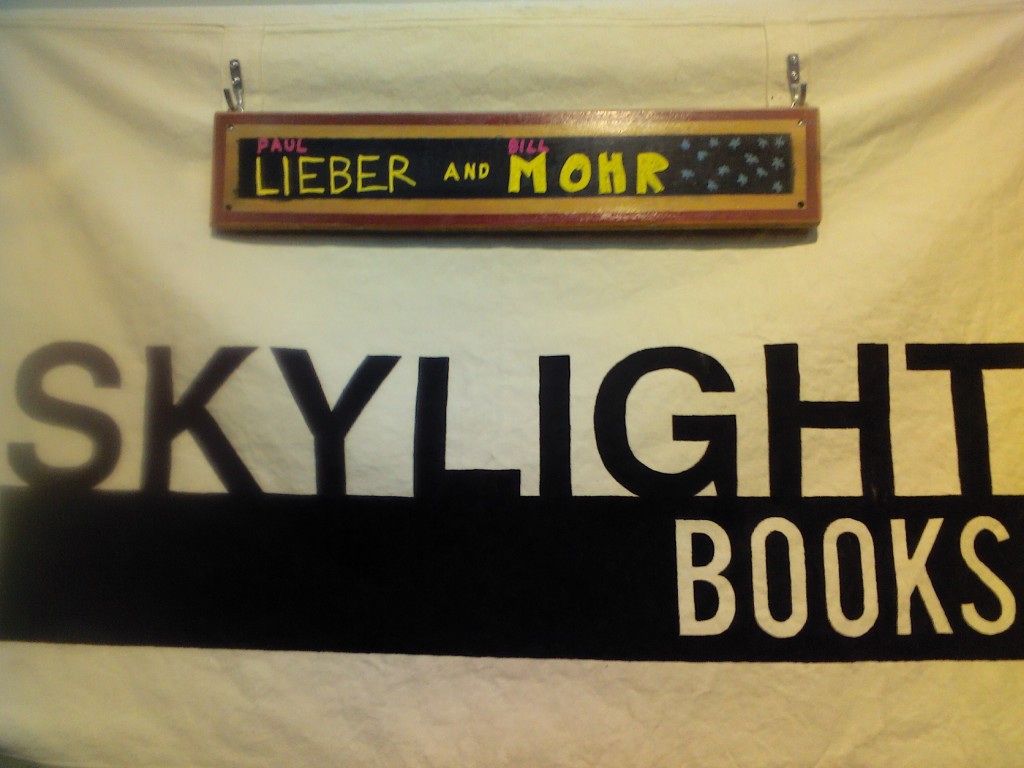
Tuesday, October 23, 2018: “Who blurbed your book?”
The debut reading of The Headwaters of Nirvana went fairly well. Noel Alumit, the host of the reading, asked me to read 20 minutes. Gail Wronsky began her introduction at 5:07, and I started my reading at 5:10. I ended my reading at 5:31, without having checked the time.
For the record, here was the set-list for the Skylight reading:
“Rules for Building a Labyrinth,” which I dedicated to Lynn McGee
“One Miracle”
“Complexities”
“Real Days Off”
“Terrorism: The View from Century City”
“The Restoration”
“Answer”
“Why the Heart Does Not Develop Cancer”
I would have preferred to read eight more recent poems, but my job was to encourage people to buy the book, and five or so people in the audience did so. My thanks for their support.
I was about to leave the bookstore when suddenly I saw Shana Olson, who had missed the reading but had gotten there in time to congratulate me on the publication of my first full-length volume of poems, published in this country, in well over 30 years. I sat in a corner of the store and read a couple of poems to her out of the book, as a way of thanking her for making the effort to attend. She read along in a copy I loaned her; afterwards, she flipped to the back cover. “Who blurbed your book?” she asked out loud.
“No one,” I said, which seemed to surprise her. If she had thought it through, however, she would have been less perplexed. One only goes over 30 years without a full-length volume of poems in this country if one is extraordinarily marginal, and any blurb that tried to gloss over that fact would end up revealing its superficial knowledge of the political economy of U.S. literature. There may be a dozen or so poets I could have asked, but would it have been fair to them? It’s tough enough to write a blurb when you are friends with a poet, but it goes beyond an ordinary favor when the poet is someone only vaguely familiar — as how could I not be, since they have had no volume of my work to read for a very long time. It’s a circle with a rodeo-cinch grip on its leash.
For the record, here are the poets I would have been delighted to have had a blurb from. If you are one of these poets, and think to yourself, “Oh, I would have written one, if he had asked,” then please forgive my shyness. Also, since I have at various points published both poems by and reviews of Healy, Vangelisti, and Ostriker, it felt more than a little awkward to indulge in anything that gave the appearance of reciprocity.
Eloise Klein Healy
Ellen Bass
Juan Felipe Herrera
Marilyn Nelson
Anselm Berrigan
Marvin Bell
Paul Vangelisti
Rae Armantrout
Heather McHugh
B.H. Fairchild
Alicia Ostriker
Linda Bierds
Kim Addonizio
Denise Duhamel
Michael Lally
I realize what an odd list this will seem to a few poets I’ve known over the years, such as Cecilia Woloch, Ron Silliman, and Michael Davidson, who are all too often asked for blurbs. Well, just to make it more peculiar, I’ll add a few more names:
Michael Hannon
Sandra McPherson
Garrett Hongo
Kit Robinson
Michael McClure
Gerald Locklin
The average age of this score of poets is slightly older than I am; the brevity of my list may reflect how relatively few people my age began publishing over a half-century ago, and are still active. A few readers of this blog might wonder about the absence of all but a couple poets in Los Angeles. I rarely see those I worked with back in the 70s or 80s. Some, like Jim Krusoe, Kate Braverman, and Dennis Cooper, have become known for their fiction; others, such as Lee Hickman and Wanda Coleman, have died. Of all the poets named in this blog entry, in fact, they are the two poets whose blurbs would have been the most meaningful. If Tom Lux hadn’t died, I would have asked him for a blurb again. He wrote one back when Cahuenga Press had accepted a manuscript about 15 years ago that never got past the typesetting stage because I was such an obstreperous stickler about the type size. Mea culpa. What Tom wrote back then wouldn’t transfer to Headwaters, though, since it is on a different scale than the Cahuenga ms.
I’ve been asked to write blurbs fairly often the past dozen years. I don’t think it occurs to anyone who asks to wonder about how limited my options are in the current prevalence of that literary maneuver in this country. I suppose this is the source of my immense appreciation for the work that Jose Rico and Robin Myers did in translation my work and each writing some prose about it for the edition that Bonobos Editores published in Mexico in 2015. There is a blurb on the back cover of Headwaters, though it is somewhat submerged. It is in Spanish, and it comes from an article in which the best books of poetry published in Mexico were chosen by three different critics. Asking for acknowledgement in one’s own country seems somewhat superfluous, given that the challenge is always to be worthy of attention outside of the narcissism of one’s own culture.
 About Bill Mohr
About Bill Mohr